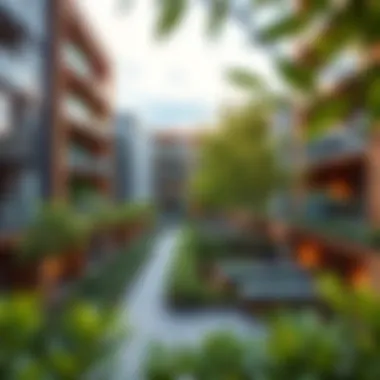Exploring the Global Village Concept in Real Estate


Intro
The real estate landscape continues to evolve, fueled by the interconnectedness that defines our modern world. The notion of a global village has found its footing here, influencing the very fabric of property markets. This concept, which suggests that geographical boundaries have become less meaningful due to technological advancements and cultural exchange, is reshaping how we perceive home and investment.
As property buyers and investors step into this newly defined realm, understanding the implications of a global village becomes crucial. With the right insights, individuals can navigate the complexities of urban living more effectively.
Market Insights
Latest Trends in Dubai Real Estate
Dubai stands as a striking example of the global village ethos, with its skyline reflecting diverse cultures and ambitions. The city has garnered attention for its unique blend of luxury and innovation in real estate. Recent trends point toward an emphasis on community-driven developments, which seek to foster stronger interpersonal connections among residents.
- Mixed-Use Developments: Projects like Dubai Creek Harbour and City Walk are designed to integrate residential, commercial, and recreational spaces, promoting a sense of belonging.
- Sustainability Focus: There’s an increasing demand for eco-friendly properties. Buyers are now looking not just for luxury but sustainable features, such as energy-efficient designs and green spaces.
- Tech Integration: Smart homes are no longer just a trend; they are becoming a staple. Features such as automated lighting, climate control, and security systems are highly sought after.
These trends underscore a shift toward urban environments that prioritize connectivity, efficiency, and sustainability.
Impact of Global Events on Local Market
Global events, from economic shifts to pandemics, can have a profound impact on local real estate markets. For instance, the COVID-19 pandemic accelerated remote working trends, resulting in a significant shift in property demands. People are now searching for homes that can accommodate office spaces.
Moreover, fluctuations in international travel and investment flows influence property prices and availability. Economic downturns may temporarily dampen investment enthusiasm, but they often lead to attractive buying opportunities for those willing to look beyond the surface.
Such events remind us of the interconnected nature of today’s economy and how a ripple on one side of the planet can have waves reaching far into the Dubai market.
Investment Opportunities
High-Return Areas for Property Investment
For investors, pinpointing high-return areas is essential in a fluctuating market. In Dubai, some neighborhoods consistently exhibit growth potential:
- Dubai Marina: Renowned for its luxury living and stunning waterfront views, this area attracts expatriates and vacation renters alike.
- Jumeirah Village Circle (JVC): Offering more affordable options, JVC is becoming popular among families and young professionals, making it a hotspot for renters.
- Downtown Dubai: The heart of the city, Downtown attracts wealthy investors with its mix of high-end apartments and proximity to cultural landmarks.
Tips for First-Time Investors
If you’re stepping into the world of real estate for the first time, here are a few practical tips to keep in mind:
- Conduct Thorough Research: Understand the market dynamics and specific neighborhoods. Websites like Real Estate Regulatory Agency or Bayut provide valuable insights on current trends.
- Prioritize Location: Remember, location can make or break your investment. Look for areas with growth potential and accessibility.
- Budget Accordingly: Factor in additional costs such as maintenance fees or property taxes. Always keep some buffer for unexpected expenses.
- Connect with Locals: Building a network within the community can unlock valuable information about forthcoming projects or investment opportunities.
By staying informed and strategic, investors can navigate the complexities of the global village effectively.
"Understanding the pulse of a community is key to successful real estate investment. It’s not just about property; it’s about people and connections."
As we continue to explore this global village concept in real estate, the importance of community, cultural integration, and emerging trends cannot be overstated. This narrative not only serves property buyers but emphasizes the collective ethos epitomized by urban living in the modern era.
For more insights on real estate investment trends and community developments, you can visit sites like Inman or The National.
By understanding the foundation of a global village and these insights, buyers and investors alike can position themselves for success in an ever-changing market.
Understanding the Global Village
The notion of a global village has ballooned into an essential concept in everyday discussions, particularly in the realm of real estate. The way people live and interact within their communities has transformed dramatically with the integration of global influences. Understanding the global village is not just about recognizing its social implications; it's crucial for property aspirations, investments, and urban development strategies. In this context, various elements come into play, ranging from digital connectivity to cultural exchange, all of which are paramount to creating thriving communities.
Definition and Origin
The term "global village" traces its roots back to the Canadian media theorist Marshall McLuhan, who introduced it in the 1960s. He envisioned a world interconnected through technology and media, where distances became insignificant, much like living in a village. In real estate, this concept indicates a paradigm shift. Properties are no longer just localized; they are part of a larger global narrative. Through enhanced communication channels, cultural barriers dissolve, allowing for a fluid exchange of ideas and lifestyles across borders. This interweaving of cultures impacts the housing market, shifting buyer behaviors and preferences, which are now influenced by various global trends.
Theoretical Foundations
At its core, the global village concept is grounded in globalization theories. These theories emphasize the roles of technology, economy, and culture in shaping community interactions. Real estate plays a crucial role as both a product and facilitator of these dynamics. For investors and developers, understanding the theoretical underpinning is vital. It can help them anticipate market changes and buyer preferences that stem from a diverse cultural exchange. An ongoing dialogue exists between localized conditions and global influences, which complicates but enriches the real estate landscape.


Impact of Technology on Community Life
Technology undeniably revolutionizes community life within the global village framework. Innovations such as online property listings, virtual home tours, and real-time communication channels enable far-reaching connections among buyers, sellers, and agents. This immediate accessibility reshapes how people view homes; geographical limitations diminish with a single click.
In practical terms, imagine a family in London seeking properties in Dubai without having to set foot in the city. They're able to explore listings via an app that integrates augmented reality features, providing them with immersive viewing experiences. This kind of technological advancement also nurtures a sense of community, as people can now engage with diverse cultural backgrounds and traditions, potentially leading to more harmonious and inclusive neighborhoods.
"In today's world, the ability to connect with others transcends physical boundaries, enhancing the communal fabric of our lives."
The implications for real estate are vast. Developers might opt for designs that reflect varying cultural aesthetics, catering to an international clientele. Communities are built not just on proximity but on shared digital experiences and interactions. Thus, technology serves as a bridge that enriches and enlivens the global village concept, reshaping property dynamics in the process.
Globalization and Real Estate
In today’s world characterized by rapid advancements and increasing interconnectedness, the intersection of globalization and real estate is perhaps more significant than ever. The globalization phenomenon entails not just the flow of goods and services but extends into the very core of how people view property ownership and community living. This section delves into the key elements, benefits, and considerations surrounding globalization in the realm of real estate.
Evolving Market Dynamics
The dynamics of real estate markets across the globe are continuously morphing. Factors such as foreign investment can dramatically influence local markets, leading to price hikes in cities that are popular among international buyers. This trend isn't confined to any particular region; whether in the bustling streets of New York, the serene avenues of London, or the innovative skyline of Dubai, global investors are keen on diverse opportunities.
In many places, the rise of digital platforms like Zillow or Rightmove has democratized access to property information, allowing buyers from different corners of the world to access market insights that were once exclusive to local agents. Such changes foster competitive pricing and more fluid market dynamics that cater to the needs of a global clientele.
In many cases, traditional real estate practices are making way for more flexible arrangements. For instance, the increasing use of virtual reality tools enables potential buyers to tour properties without ever stepping foot in the city, breaking geographical barriers in unprecedented ways.
Investment Patterns in a Globalized Market
Investments in real estate have shifted significantly due to globalization. Those who invest today do so with an eye on not only local yields but also international fluctuations. The financial landscape is rife with both challenges and rewards. For instance, many investors are diversifying their portfolios to include properties in emerging markets, seeking higher returns where risks might seem daunting but potentially lucrative.
Key Patterns to Note:
- Increasing Interest in Secondary Cities: Investors are not limiting their search to well-known hotspots. Cities like Lisbon and Porto are attracting attention as buyers seek more affordable, yet appealing, locales.
- Crowdfunding and Real Estate Syndication: These methods have emerged as significant players, allowing smaller investors to partake in larger property deals that they might not otherwise afford.
- Focus on Sustainability: The demand for eco-friendly buildings is on the rise. Investors are keen on properties that not only meet their financial goals but also adhere to environmental standards.
Through these patterns, it's clear that the evolving investment landscape reshapes who is buying property, where, and why.
Diverse Buyer Profiles
The types of buyers entering the real estate market today are more varied than ever. From young professionals seeking city dwellings to retirees longing for a quiet retreat, each group brings distinct needs and preferences.
- Expatriates: Individuals relocating for work often act quickly in the market. They tend to favor close-knit communities and every amenity within reach. For example, a young tech professional from Silicon Valley may view real estate options in Dublin with an eye for both liveability and investment potential.
- Remote Workers: With the rise of remote working, more individuals are choosing homes that offer peace and tranquility far from the office hustle, often in suburban or rural areas. They place a premium on spacious homes that can accommodate hybrid work environments.
- Investors from Emerging Economies: Many buyers from nations with burgeoning populations are looking overseas for investment, thus contributing significantly to areas like Dubai, where they see potential growth and lucrative returns.
To attract various buyer profiles, real estate developers and agents must understand these demographics and tailor their offerings accordingly. Recognizing the nuances that drive each group can lead to innovative marketing strategies and ultimately, successful transactions.
Globalization reshapes the buyer landscape, presenting unique challenges and opportunities for real estate professionals.
The confluence of globalization and real estate reshapes not only investment strategies but also the nature of communities themselves. As we proceed further into the intricate details of this global perspective, we gain a firmer grounding on how these ideas translate into practical experiences in the real estate market.
Dubai as a Microcosm of the Global Village
Dubai stands as a remarkable example of the global village concept in real estate, reflecting the interconnectedness of cultures, economies, and lifestyles in our contemporary world. This city, often referred to as a melting pot, showcases how diverse communities come together to form a unique identity. As a major trading hub, Dubai attracts individuals from various backgrounds, each contributing to its dynamic social fabric. The importance of Dubai lies not only in its architectural marvels and investment potential but also in its ability to embody the spirit of global collaboration.
Cultural Melting Pot
Dubai’s cultural landscape is a vivid illustration of a melting pot. It boasts more than 200 nationalities living in harmony, making it an environment rich in diversity. This combination creates a unique atmosphere where different customs, traditions, and cuisines intermingle.
- Residents enjoy a variety of cultural festivals, art exhibitions, and culinary experiences that reflect this diversity.
- The city's policies promote multiculturalism, enabling expatriates to maintain their cultural identities while integrating into the local society.
This cultural integration is beneficial for real estate as it fosters a vibrant community, attracting investors and homebuyers alike. Here, every neighborhood offers a unique cultural experience, from the traditional markets of Deira to the modern luxury of Downtown Dubai, appealing to various tastes and lifestyles.
Urban Development: A Blend of Tradition and Modernity
In Dubai, urban development illustrates a fine balance between tradition and modernity. Skyscrapers like the Burj Khalifa symbolize contemporary architecture while areas like Al Fahidi reflect the city’s historical roots. This blend is crucial as it caters to both real estate markets – those seeking lavish modern living spaces and those drawn to the charm of traditional Arabian architecture.


- Infrastructure is meticulously planned, incorporating green spaces and cultural landmarks amidst urban landscapes.
- Developing areas, such as Dubai Marina, showcase a futuristic vision while maintaining accessibility to community resources.
The result is a seamless integration that enhances property value and attracts a wide range of buyers, ensuring that both personal and investment needs are met.
Real Estate Innovations in Dubai
Dubai is at the forefront of real estate innovations, setting trends that resonate globally. The city's approach to property development and management is characterized by several notable advancements:
- Smart Homes and Buildings: Incorporating innovative technologies to enhance living experiences—think energy-efficient designs and home automation systems that improve comfort and security.
- Sustainability Initiatives: Dubai aims to be a global leader in sustainable development, with projects focusing on eco-friendly construction and energy-efficient living.
- Mixed-Use Developments: Communities like Dubai Design District merge residential, commercial, and cultural spaces, promoting a live-work-play environment. This type of development responds to rising demand for convenience in urban settings.
These innovations not only attract expatriates and foreign investors but also ensure that existing residents enjoy improved living conditions, making Dubai a thriving global village in the realm of real estate.
Community and Housing Trends
The evolution of urban living and housing trends is pivotal in understanding the essence of a global village. In a world where borders blur due to advanced communication and travel, the way people live and share spaces is shifting in significant ways. Communities are no longer defined solely by geographic proximity; rather, they are shaped by common values, interests, and lifestyles. This section will delve into key trends that not only reflect the changing social landscape but also highlight how these trends are underpinning the concepts of community and housing in the modern era.
Rise of Co-living Spaces
The concept of co-living spaces has gained traction among diverse demographics. These communal living arrangements appeal not only to young professionals seeking affordable housing but also to retirees longing for connection. Co-living fosters a sense of community, allowing for shared experiences while reducing the high costs typically associated with rent and utilities.
Many co-living environments provide amenities like shared kitchens, communal lounges, and recreational facilities. This setup encourages social interaction and promotes collaborative living, where residents can share not only physical space but also ideas and resources. Most notably, these spaces often resort to flexible leasing terms, appealing greatly to expatriates and digital nomads.
Co-living arrangements are reshaping the fabric of urban environments as they offer a solution to the pressing need for affordable housing in crowded cities.
Integration of Smart Technology
As technology finds its way into every aspect of our lives, its integration into housing is quintessential. Smart homes equipped with IoT devices have become increasingly popular, enhancing the functionality and efficiency of living spaces. Homeowners now seek integrated systems that can manage lighting, heating, and security through their smartphones.
Smart technology not only simplifies home management but also promotes energy efficiency. For instance, energy management systems can monitor energy consumption, suggesting ways to reduce costs and carbon footprints. Developers who focus on integrating smart technology into their properties often attract environmentally-conscious buyers, making it a strategic move in today’s market.
This trend aligns well with the lifestyle of individuals in a global village who prioritize both convenience and sustainability.
Emphasis on Green Living
As environmental concerns escalate, green living and sustainable practices gain importance. This shift towards eco-friendliness is impacting design choices in real estate, influencing everything from the materials used in construction to the incorporation of green spaces within urban developments.
Homebuyers now actively seek properties that adhere to sustainable building practices and offer features such as solar panels, energy-efficient appliances, and rainwater harvesting systems. Additionally, urban planners are increasingly prioritizing green spaces—parks, rooftop gardens, and community gardens—not just for aesthetics, but for their role in enhancing the quality of life in densely populated areas.
In the context of a global village, the emphasis on green living not only contributes to the wellbeing of residents but also reflects a collective responsibility toward the planet.
Ultimately, as urban environments evolve, understanding these community and housing trends is crucial for investors, developers, and homebuyers alike. It is about more than just property investment; it is about the lifestyle and community each property encompasses.
Legal and Regulatory Considerations
Navigating the intricate landscape of real estate requires a firm understanding of the legal and regulatory framework within which it operates. This becomes even more critical in the context of a global village, where diverse legal systems intersect and influence property transactions. Regulatory considerations can make or break investment opportunities, particularly in regions like Dubai that attract a broad spectrum of buyers and investors from all over the globe. Below we delve into several key areas that shape this vital aspect.
Understanding Property Laws in Dubai
Dubai stands out as a unique case study in property law due to its rapid urbanization and international appeal. The legal framework governing property ownership is multifaceted, integrating both local and international laws to accommodate its varied demographic. At its core, property ownership law in Dubai primarily revolves around the principles outlined in the Real Estate Law No. 7 of 2006, which governs the rights and responsibilities of property owners.
Here are some essential features of property law in Dubai:
- Freehold and Leasehold: Foreign investors can purchase properties on a freehold or leasehold basis, with designated areas available for full foreign ownership. This model encourages substantial investment without relinquishing control.
- Title Deeds: Title deeds must be registered with the Dubai Land Department—a crucial step that secures ownership rights. Only registered title can provide legal verification of ownership, protecting buyers from potential disputes.
- Regulatory Bodies: The Real Estate Regulatory Agency (RERA) oversees property transactions and ensures compliance with established laws, adding another layer of protection for investors.
Understanding these laws is fundamental for anyone looking to invest, as they can directly influence not just ownership opportunities but also resale potential and rental yields.
International Ownership Structures
When discussing property investment within the global village concept, international ownership structures come into play. There are various ownership formats utilized by foreign investors, each tailored to specific needs and legal considerations:


- Limited Liability Companies (LLCs): Often favored for significant investments, LLCs allow multiple investors to pool resources while covering personal liability. This structure is particularly beneficial for expatriates who wish to invest collectively.
- Property Investment Funds: These funds enable investors to acquire shares in a broader property portfolio without individually owning property. They can offer diversification and reduced risk.
- Joint Ventures: Engaging in partnerships with local developers or real estate firms frequently allows foreign investors to navigate the legal landscape efficiently, leveraging local knowledge and experience.
Understanding these structures helps potential buyers or investors align their strategies with local legal frameworks, enhancing their investment effectiveness and compliance.
Navigating Regulations for Foreign Investors
With Dubai’s appeal to a global audience, navigating regulations for foreign investors can often feel like walking a tightrope. It's crucial to comprehend the full spectrum of regulations that govern property acquisition:
- Residential vs. Commercial: The rules differ for residential and commercial property ownership, where commercial ventures may face stricter regulations. Thus, understanding your particular situation is necessary for smooth transactions.
- Taxes and Fees: Investors should be aware of associated costs such as property registration fees, maintenance charges, and, where applicable, taxes which may vary substantially based on ownership type.
- Utilization Requirements: It's also essential to hold a complete understanding of how properties can be utilized, especially in mixed-use areas where different zoning laws apply.
To facilitate investments, many seek legal consultation or representation, ensuring compliance while minimizing legal risks. Moreover, keeping abreast of evolving regulations can drastically change investment protocol, so ongoing education is recommended.
"Understanding the legal landscape can significantly enhance your confidence in making investment decisions—knowledge is truly power in real estate."
As the global village concept escalates, so too does the complexity of its legal environment in real estate, making it imperative for investors to remain vigilant and informed.
The Future of the Global Village Concept
Predicted Trends in Global Living
As we venture further into the 21st century, several trends are emerging in global living that may redefine how we perceive our homes and communities. Among these is the rise of mixed-use developments, which advocate for live-work-play environments.
- Neighborhood Integration: Future neighborhoods are likely to blend residential units with commercial spaces, cultural hubs, and parks, promoting community interaction and engagement.
- Remote Working Spaces: The pandemic has accelerated remote work, leading to an increased demand for residences designed with dedicated office areas, high-speed internet, and soundproofing.
- Cultural Experiences: The importance of cultural connectivity will likely drive demand for properties that offer connections to diverse communities and global experiences, influencing design aspects and amenities.
This convergence of living, working, and cultural elements signals a shift from traditional segmentation, responding to buyers who seek comprehensive environments that cater to a spectrum of needs.
Impact of Climate Change on Urban Design
The shadow of climate change looms large over urban design, urging cities to rethink how they develop and manage real estate. The response to climate change is not just about protecting assets; it’s about adopting creative strategies that promote long-term sustainability.
- Resilient Architecture: Buildings will increasingly incorporate climate-resilient designs, using materials and technologies that mitigate effects of extreme weather, flooding, and heat.
- Green Certifications: Developers will focus on obtaining sustainable building certifications such as LEED, appealing to environmentally-conscious buyers who prioritize eco-friendliness.
- Public Transportation Foci: Urban planners are likely to emphasize expanding public transport links, enabling easier access to amenities while minimizing reliance on cars.
These adaptations are not solely about compliance but enhancing the appeal of communities that are prepared for future challenges, making investments within these areas more attractive.
Evolving Buyer Expectations
As the landscape of the global village evolves, so too do the expectations of buyers. It's not just about square footage or location anymore; buyers are becoming savvier and more discerning. A few key shifts can be identified:
- Technological Integration: Buyers now expect smart home features, from automated lighting systems to security measures that can be controlled via an app. The demand for technological upgrades in homes is on the rise.
- Quality of Life: A focus on mental well-being and lifestyle amenities is increasingly influencing purchasing decisions. Developments with green spaces, fitness facilities, and eco-sustainability practices are seen as more desirable.
- Community-Centric Living: Today’s homebuyer often seeks a sense of community—properties that offer shared spaces or organize social gatherings are becoming increasingly popular. Buyers want to connect with their neighbors, enhancing their living experience beyond mere real estate.
In essence, adapting to these evolving expectations will be paramount for stakeholders in the real estate industry.
The future of real estate within the framework of a global village is a dynamic interplay of culture, technology, and sustainability—shaping our homes and the way we live.
As the global village concept takes shape, investors and developers must stay ahead of these currents, aligning their strategies with the values and needs of future residents.
Culmination
The conclusion of this exploration of the global village concept within the real estate sphere encapsulates some pivotal takeaways. As urban landscapes evolve and become interwoven within a global framework, understanding the implications for investors, homebuyers, and even traditional real estate agents becomes increasingly essential. The global village signifies more than just a geographical connotation; it's a reflection of human behavior, community need, and technological advancement.
Summation of Key Insights
Understanding the global village concept draws attention to a variety of key insights:
- Interconnectedness: The world is more connected than ever, leading to diverse buyer profiles and shifting investment patterns. This offers real estate professionals new avenues to explore.
- Cultural Integration: In places like Dubai, where east meets west, real estate reflects a blend of cultural influences, enhancing market appeal. Developers have to consider local customs while appealing to international tastes.
- Sustainability Trends: As green living gains traction, how properties are built and marketed is transforming. Sustainable practices aren't just a trend; they are becoming a requirement for buyers.
Moreover,
- Technology’s Role: With smart technologies being integrated into homes, the way buyers approach property is changing drastically. The realm of real estate is embracing a digital footprint, leading to changes in marketing and sales strategies.
Final Thoughts on Global Community Living
In wrapping up, global community living presents a dual-edged sword of opportunity and challenge. On one hand, it fosters collaboration and resilience among diverse populations, enriching lives in the process. However, it also brings forth complexities in legal regulations and market dynamics due to the varying cultural backgrounds of buyers.
Investors and buyers alike should be attuned to these emerging trends that envelop the global village ethos. Each real estate decision will hold more weight as it shapes not just individual portfolios but communities at large.



